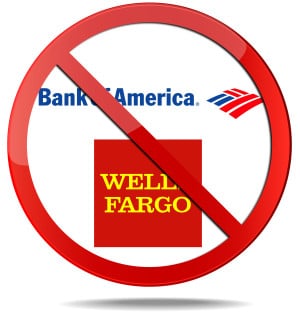Citing a lack of communication and unnecessary delays, real estate agents in greater Boston are discouraging buyers from using larger, national banks in favor of more familiar local lenders.
From Bank of America to Wells Fargo, agents say big banks’ preapproval letters don’t prove ability to repay, and that the lenders aren’t coming up with the funds at closing.
David Twombly, an exclusive buyers’ agent with Cambridge-based 4Buyers Real Estate, was working with a graduate student looking for a condominium in Somerville. Her parents were helping her finance the purchase from their home in Seattle.
“Her father said he was going to use Wells Fargo,” Twombly said. “I tried to dissuade him, but he said he’d used them four times before. He said he had a relationship with those people. I made sure he knew he needed a commitment letter a week before the closing.”
As the commitment date neared, Twombly talked to the buyer and called Wells Fargo and got no response. Ultimately, the closing date came and went and Twombly had to ask for two extensions on the mortgage commitment. He said Wells Fargo was nonresponsive and cavalier.
“What was at risk was his $30,000 deposit,” Twombly said. “The seller didn’t have to grant the extensions. It caused a lot of unnecessary stress and angst. The listing agent told me if she had noticed the preapproval was from Wells Fargo in the original offer, she’d have told me to come back with another one.”
Wells Fargo, for its part, says its working on improvements.
“We continue to improve in this aspect of our business based on customer feedback,” a bank spokesperson said in an emailed response to a request for comment. “Tools like Wells Fargo’s yourLoan Tracker allows customers to see the progress of their loan as it moves to closing, upload documents at their convenience and has other features that contribute to the efficiency of getting customers to an on-time closing.”
Twombly said his client got the condo she wanted, but the process would have been much smoother and less stressful if she had used a local lender he was familiar with, and that’s what he tells his new clients.
“I tell them this exact story verbatim,” Twombly said. “Everything worked out for my client, except for that unnecessary stress. It’s just another great battle story I can use to guide my clients.”
The Stakes Are High
David Bates, of William Raveis’ Boston office, has had several similar experiences with clients who get financing through BofA. Increasing numbers of listing agents in Boston advise sellers not to accept offers that are financed by that lender, saying BofA’s preapproval letters aren’t worth the paper they’re written on, he said, and surely don’t prove a buyer is able to finance their purchase.
Bates said he recently worked with a young entrepreneur who made a competitive offer on a multimillion-dollar home as soon as it came on the market, before the open house. His offer did not include a mortgage contingency, though the buyer did intend to get financing. Both Bates and the listing agent advised against using BofA, but the bank offered the buyer a competitive rate, so he applied for a mortgage through Bank of America with seven weeks to go before the closing.
“We had a doable timeline,” Bates said. “Because the listing agent had another experience with them, he was checking in a lot and keeping the pace of the deal fast. Four days before the closing, Bank of America communicated to the buyer there was a 50/50 chance they could close on time and a good chance they couldn’t close at all.”
Bates asked for an extension on the mortgage contingency, but the sellers wouldn’t give his client one. His buyer faced losing a six-figure deposit if he couldn’t get financing or gather more than $2 million in cash.
“My buyer eventually got the cash together and closed on the house without the loan,” Bates said. “It was everybody’s worst nightmare, but we closed on time.”
Bates worked with another recent South End buyer to make an offer on a $1.5 million home with a mortgage contingency and a preapproval letter from BofA – and the listing agent wouldn’t accept it.
Bates has had clients successfully finance with BofA in the past, and he is currently personally financing a car with the bank. But he tells his clients that going through that lender for a home loan puts them at a competitive disadvantage in the current seller’s market.
“If I had a listing and I got two offers with same price and terms, one with financing through Bank of America and the other from someone else, I’d point out to the BofA people that if they weren’t willing to consider another lender, I’d recommend my seller accept the other offer,” he said. “It’s another small hurdle in a very competitive market.”
Through a spokesperson, BofA said it “encourages all potential applicants to become preapproved. A Buyer Ready preapproval provides the customer with important information about what they can afford prior to their application. Ninety-six percent of customers in our Buyer Ready program across the country this year have received final approval. In Boston, 100 percent were approved.”
A half-dozen real estate agents and managers contacted for this story had similar experiences with large banks headquartered out of state and confirmed the trend, but declined to speak on the record about it.








